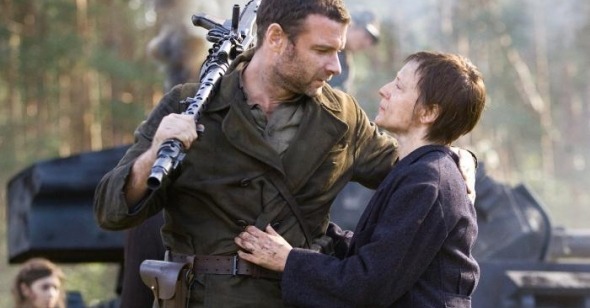The Brothers Gloom
By Jeannette Catsoulis
Defiance
Dir. Edward Zwick, U.S., Paramount Vantage
Jewish-superhero movies may be thin on the ground, but that’s no reason to welcome Defiance as anything other than an old-fashioned adventure yarn hobbled by its own sense of religious significance. This fact-based story of the swashbuckling Bielski brothers—smugglers and skirt-chasers and no strangers to firearms—could have been a rousing project had director Edward Zwick worried less about sanctifying his ancestors and more about entertaining his audience.
As we learn from a lengthy piece by Zwick in the Christmas Eve edition of The New York Times, the Bielskis were distant relatives who, from 1941-43, sheltered more than a thousand Jews from the Nazis in the forests of Belarus. “Directing a film inevitably becomes personal for me,” says Zwick, illuminating at least part of the problem. “This one, though, felt as if some private boundary were breached.” The goal of commemoration may be understandable, but it rarely plays well with others, and here it strangles every attempt by star or script to stray from legend polishing. So when Morally Conflicted Brother Tuvia (a goyish Daniel Craig) kills a rebellious Jew who’s trying to overthrow his leadership, or allows his flock to vent its rage on a sacrificial German soldier, God forbid he should be allowed a flicker of satisfaction. Instead, he’s so tortured that he does everything except gnaw off his knuckles.
All this soul-searching (should we kill collaborators or just rob them?) is fraying the last nerve of younger brother Zus (an indispensable Liev Schreiber), who’d rather shoot early than be sorry later. At the beginning of the movie, when the brothers’ parents are slaughtered by Nazis and their enablers, it’s Tuvia who decides that playing shepherd to a swelling straggle of refugees is the decent thing to do, and we never feel Zus is entirely convinced. So whenever the story gathers a head of steam, a hint of lust or a smidgen of vitality, the brothers’ disagreements function effectively as cold showers. (The movie should really be called Debate.) So frequent are their arguments, and so repetitively staged, that Zus is forced to run off and join the Soviet army just to keep his rifle skills and his sanity. You’ll be wishing you could accompany him.
But if Tuvia is the arm and Zus the hammer, what of next-in-line brother, Asael (Jamie Bell, palest of all)? Mostly he hangs around the fringes of the movie, gazing admiringly at Tuvia on his white steed and making cow eyes at a wispy little refugette. (The women of Defiance—and most of the men—appear to have been defrosted from Schindler’s List overstock, and function mainly as cooks, bottle-washers, and hand-wringers.) Like his big brothers, Asael will learn the comforts of securing a “forest wife,” a designation that comes with softly lit close-ups and, in the case of Tuvia’s squeeze, some picturesque emoting from beneath a fur blanket. Life in the forest is not all rations and rifles, you know.
Based on Nechama Tec’s book and filmed in the bogs of Lithuania, Defiance switches cunningly from newsreel to fiction and back again without losing its drained palette or clunky tone. “A director’s job is to create an aura of verisimilitude,” says Zwick, which must explain Tuvia’s water-parting exodus from the forest at the head of a conga line of survivors. Scenes like this are so embarrassingly awful it’s easy to forget the very real fortitude that inspired them. “This story needed to be told,” insists Zwick, and he’s probably right. It’s just a pity he was the one to do it.
